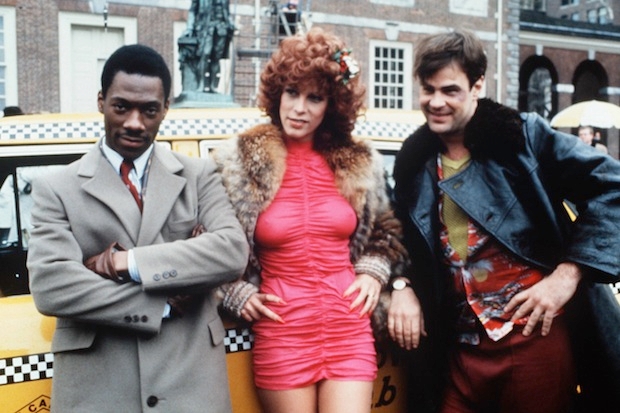Next month marks the 30th anniversary of the release of what is, in my opinion, one of the funniest films of all time: Trading Places.
Starring comedic demigods Eddie Murphy and Dan Ackroyd, together with Jamie Lee Curtis and Denholm Elliot, this 1983 critical and commercial success is an amusing and trenchant satire on race, class, money and the whole American dream. When a destitute street hustler Billy Ray Valentine (Murphy) unknowingly swaps places with pampered, prissy Wall Street commodities broker Louis Winthorpe III (Ackroyd) and takes over his privileged life as part of a one-dollar bet — a nurture versus nature scientific experiment conducted by the fabulously wealthy yet morally repugnant Duke brothers for whom Winthorpe works — the results are both hilarious and deeply moving.
Directed by John Landis and set in Philadelphia and New York over the Christmas and New Year period, the film has a very specific race- and class-based plot, but at the same time its humour is universal and relevant to all. Both in America and in Britain, Trading Places has become, for my generation, a cultural touchstone, a cinematic monument to jocular genius that we should celebrate.
Whether it’s immortal lines such as the one proffered by Billy Ray when boasting of his martial arts prowess in jail: ‘Karate men bruise on the inside!’; the sight of an atrociously blacked-up Dan Ackroyd as the Rastafarian Lionel Joseph, with his lilting, faux-Jamaican patois spoken amid thick clouds of ganja smoke; or Eddie Murphy as Nenge Mboko, an exchange student from Cameroon, wishing fellow passengers on the train ‘Merry New Year!’ in that stentorian, baritone voice, comedic gems abound.
Yet amid the humour there is much wisdom. In advice culled straight from the Delphic oracle and Polonius’ advice to Laertes, Coleman the valet says to Billy Ray on the eve of his first day working for the Dukes: ‘Just be yourself, sir. Whatever happens, they can’t take that away from you.’
At its heart, the film is a condemnation of unrepentant Wall Street avarice and unfeeling, cut-throat rapacity, as exemplified by the brothers Randolph and Mortimer Duke (played with great affability and odiousness by Ralph Bellamy and Don Ameche), who rightfully get their come-uppance at the end. How painfully prescient does this now seem in the era of Bernie Madoff?
It is also a savage critique of the parochial Wasp, patrician class — of Winthorpe, his fiancée Penelope, their fickle friends and of the cosseted world of old money from which they hail, where privilege and prejudice go hand in hand and where noblesse sadly in no way obliges.
Trading Places is, in essence, a delightfully observed comedy worthy of comparison with Boccaccio’s Decameron, full of warm humanity and masterful insights into our foibles and failings, emphasising our desire to transcend the shortcomings of our circumstances. Nurture, as opposed to nature, is the most important factor in how our lives turn out. And true happiness lies not in the acquisition of money but in the establishment of relationships, regardless of colour, class or social spectrum. Sadly, 30 years later, we are still striving to create a world of social justice and equality of opportunity. There may be a black president in the White House, but hoodie-wearing black teenagers like Trayvon Martin still get stereotyped to death. Likewise here in Britain, John Major’s recent remarks about the predominance of the privately educated in positions of power and the glaring lack of social mobility still resonate.
With its skilful depictions of human psychology, timelessly witty one-liners, immensely satisfying dénouement and characters in whom we can recognise ourselves and our aspirations, Trading Places (to quote Ben Jonson’s famous remark on Shakespeare) is clearly a film ‘not of an age, but for all time’.






Comments